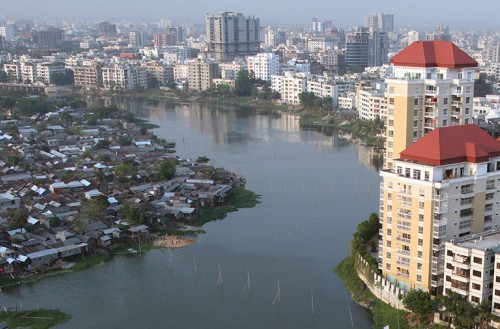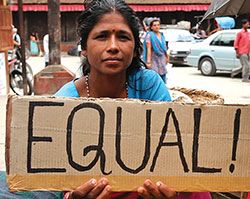Image: Dhaka, Bangladesh (Laura Elizabeth Pohl / Bread for the World).
Professor Frances Stewart will open the DLP Annual Conference 2015 tomorrow with the second Adrian Leftwich Memorial Lecture.
This year we have invited speakers and delegates to consider the politics of inequality, and Professor Stewart is well known for her groundbreaking work on horizontal inequalities. Her lecture, ‘Inequality, Justice and Policy’, will examine what a just distribution might be, raising critical questions that go to the heart of the conference theme: questions about the inherent trade-offs involved – and about the politics of these trade-offs.
It would be flat wrong to claim that inequality has been kept off the agenda. We may have reservations or grumbles about how seriously inequality is taken: the relative prioritisation of growth, poverty and inequality; which type of inequality we should be most concerned with (wealth, income, gender, rights, access); how much inequality is ‘okay’; or the role of private enterprise in closing or increasing gaps, to list just a few. Even so, from Piketty to the Palma, from the proposed SDG Goal 10 to Oxfam’s 1 percent, the debate is vigorous.
But – and this is the theme of the conference – I do think most discussions have either been technical and economic, or focused on policies and on outcomes. They have not been genuinely about politics – in the sense of politics as a process, the play of power, and deliberation over desired but contested visions of the good society.
The interesting thing about inequality – as opposed to the more far-fetched fantasies of, say, inclusive growth or sustainable development, where all good things come together in a harmonious win-win – is that it forces us to make much harder distributional decisions.
A Nepali woman spells out her call for equality (Stephan Bachenheimer / World Bank).
Tackling inequality is not just growing the pie for everyone; it’s about reallocating the slices. And this requires, dare I say, agency. It requires conscious deliberation by people – individually and collectively – to make sense of the social and political context they inhabit.
They then have to adopt, adapt or challenge existing social norms and power relations in a strategic attempt to realise these intentions. Those intentions may or may not be developmental. But that’s politics. And there are losers as well as winners.
Most measurement discussions tend to be technical ones, yet how we measure inequality, and the inequality of what, are of course deeply political issues. Happily, Alex Cobham will be addressing precisely this issue with his paper ‘Uncounted: Post-2015 and the politics of measurement’.
And in a similar way, the anti-politics machine haunts discussion of policies too. In addition to the technical concerns about impact and effectiveness, different policies clearly raise normative questions about the relative distribution of benefits and losses. Professor Stewart’s lecture will address precisely this.
Perhaps even more important is to avoid obsessing about policy, and step back to consider the political context and process. A global wealth tax? Cash transfers or public works schemes? Pre-distribution such as land reform, minimum wage, or investment in education, skills and human capital? We need to exert a good deal more effort grappling with the primary questions of how and why different policies are even possible.
Happily, an international consensus is shifting from good governance to good enough governance, from first-best to second-best approaches, and towards ‘politically smart, locally led‘ development. It is in this context that the conference participants will address how leaders and coalitions organise to create pressures for change. What role do power, ideas, coalitions, and critical junctures play? What’s politically feasible in Brazil, Honduras, Indonesia, Rwanda, Myanmar, Nigeria or Rwanda?
What we know is that there is no magic bullet, no easy route to lowering inequality. Changing the status quo often requires a highly disruptive shock or crisis, or the building of some unsavoury alliances. And solving one problem can create another. For example, in Malaysia affirmative action policies that lowered inequality have produced tensions between ethnic groups.
This is why inequality is so intensely political. If there is a law of economics, it’s surely not equilibrium but the ‘Matthew effect‘: ‘For to all those who have, more will be given, and they will have an abundance; but from those who have nothing, even what they have will be taken away’.
And if there’s a role for politics, it is to collectively deliberate on an alternative distribution and to work politically to try and bring it about.










